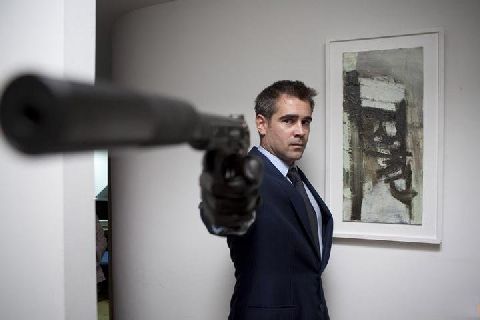London Boulevard (2010) 
“Not every criminal wants to be one.”

Director: William Monahan
Cast: Colin Farrell, Keira Knightley, Ray Winstone
Synopsis: An ex-con with a reputation tries to go straight by working as a handy man for a reclusive actress but this is unfortunately not the wish of London’s underground crime lord.
The title London Boulevard bears little meaning in relation to its plot, which pretty much typifies the air of incompleteness that hangs over the whole thing. It seems that at some point somebody had a good idea, but as that idea was expanded upon things grew increasingly woolly, loose threads were overlooked and narrative coherence precluded by a blinkered pursuit of style.
Beetle-browed Colin Farrell plays Mitchel, a reformed criminal fresh out of prison with a determination to go straight. Unfortunately for him, former associate Billy Norton (Ben Chaplin) is there to greet him as he walks through the prison gates. Despite Mitchel’s insistence that his life of crime is now behind him he allows Billy to house him in a plush house that once belonged to a former debtor of his boss, a vicious, bespectacled, cigar-chomping thug called Gant (Ray Winstone). It’s not long before Mitchel comes to the attention of Gant, who senses an unnatural level of potential in the independent, and apparently fearless, younger man. While Gant’s attempts to get Mitchel on-board grow increasingly violent, resulting in a tit-for-tat struggle that quickly spirals out of control, Mitchel begins a relationship with Charlotte (Keira Knightley), a brittle, reclusive movie star hounded to the verge of a mental breakdown by persistent paparazzi.
Writer-director William Monaghan’s stylish adaptation of Ken Bruen’s novel suffers first of all from one of the hoariest of plots – the ex-con trying to go straight who finds himself dragged back into a life of crime by his former associates. He fleshes this tired premise out with a clumsy sub-plot involving Keira Knightley’s flaky movie star that seems to belong to another film entirely. Farrell’s character flits back and forth between these two plots like a pinball, while sub-plots three, four and five eventually intertwine with his battle of wills with Gant, all of which serves to provide the viewer with a disjointed narrative that too often seems to lose its way.
Farrell gives his character an intense nervous energy that bubbles beneath a deceptively calm exterior and acquits himself quite well, while the ever-reliable Ray Winstone’s fearsome performance is perhaps mired a little too deeply within his comfort zone to make the impact that it should. Nevertheless, he and Farrell do play well off each other, and provide the film’s most compelling moments. In fact, the film contains a number of impressive scenes, but they just don’t seem to gel in the way they should. Maybe, given that Monahan is a first-time director, such flaws are forgivable to a degree, but what isn’t is the way that so many plots points are left unexplained: why does Mitchel have such a fearful reputation? Who is the creepy paparazzo with a gun who lurks outside Charlotte’s town house? Why are glossy posters of a reclusive movie star plastered across London? Monaghan neglects to inform us, leaving what appears to be a promising thriller looking disjointed and incomplete. Nevertheless, it is watch-able and reasonably entertaining thanks to the lead protagonists, and it does gather momentum as it moves towards its ironic conclusion.
A special mention, by the way, for David Thewlis, who, as a doped-up mentor of the fragile Charlotte, effortlessly steals every scene in which he appears. It would have been nice to see him share a few scenes with Ray Winstone…
httpv://www.youtube.com/watch?v=Hsm9jQcq0Ms
